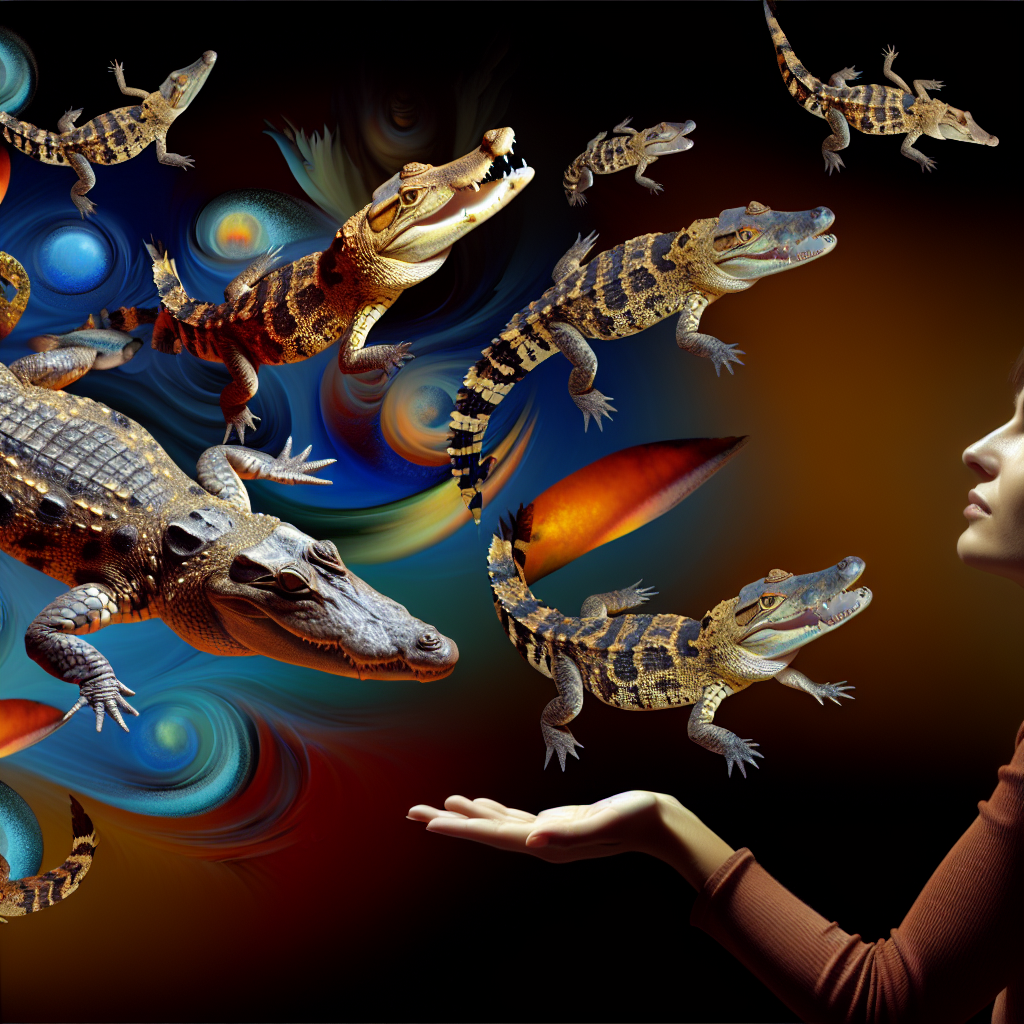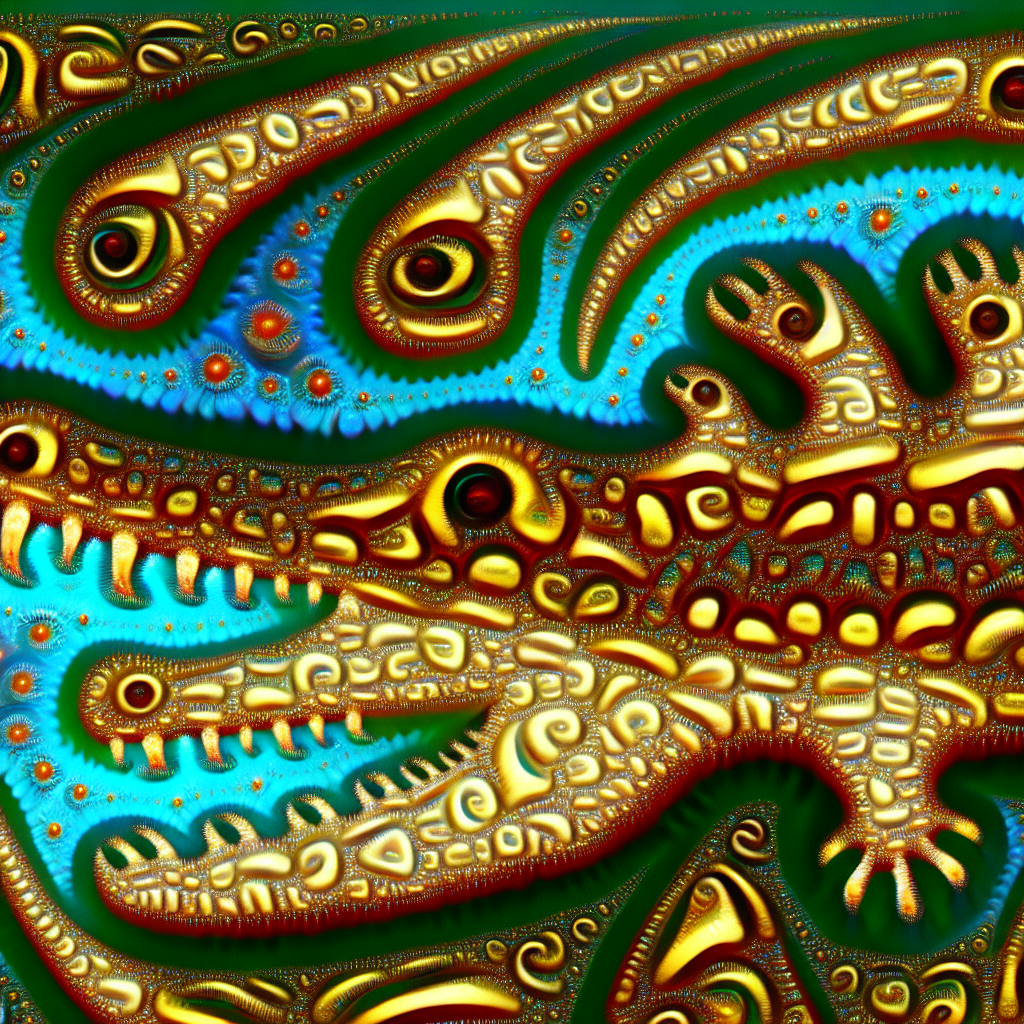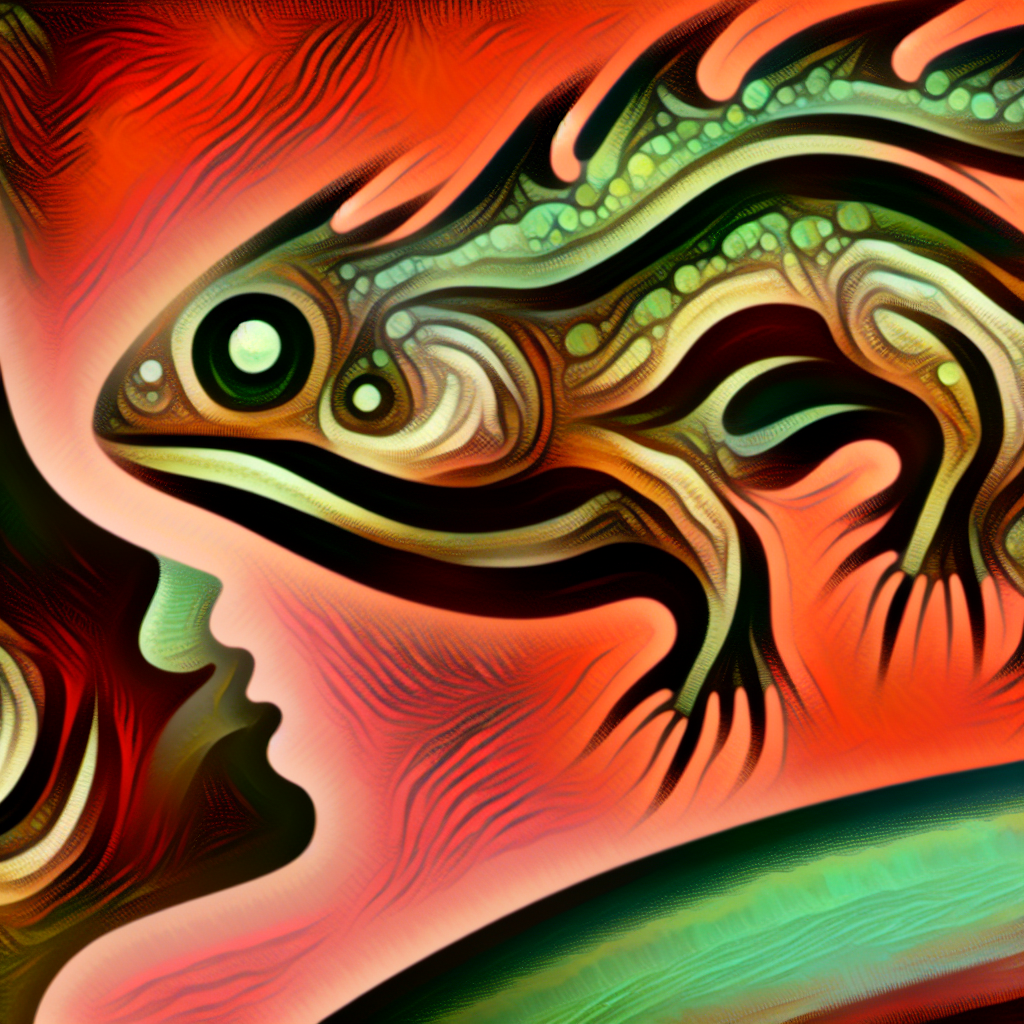
Understanding the Dream of Crocodile in Tears: Symbolism & Interpretation
Unlocking the Meaning Behind Your Dream of a Crocodile in Tears
Dreaming of a crocodile in tears can evoke a sense of confusion and curiosity. This dream holds a significant emotional weight, often symbolizing profound feelings of vulnerability and transformation. Crocodiles are commonly associated with hidden emotions, survival instincts, and primal fears; their tears may represent a release of long-suppressed feelings or a moment of introspection in the dreamer's life.
In this article, we will delve deeper into the interpretations surrounding this intriguing symbol, drawing upon traditional interpretations from Ibn Sirin's 'The Great Book of Dreams' while also exploring modern psychological frameworks, cultural significance, and actionable insights for personal growth. Understanding this dream can unlock pathways to healing and self-discovery.
Dream Interpretation - Talk to me!

📱 Bestie+ App is Here!
Experience personalized dream interpretations, save your dreams, and share them with your loved ones! Available now on iOS and coming soon on Android.
- A crocodile in tears symbolizes deep emotional wounds.
- Cultural interpretations often associate crocodiles with hidden emotions.
- Psychological insights relate crocodile dreams to personal transformation.
- Positive meanings reflect emotional release and healing.
- Negative aspects highlight feelings of betrayal or sadness.

Common Scenarios and Their Interpretations
- Dreaming of a crocodile crying at your feet.
This scenario may symbolize the dreamer's need for emotional support. The crocodile’s tears signify an outpouring of emotions that could be related to the dreamer’s own feelings of inadequacy or desire for acknowledgment.
- Witnessing a crocodile shedding tears in a beautiful landscape.
This dream might represent the reconciliation of inner turmoil and the beauty that can emerge from vulnerability. It suggests that recognizing and embracing your emotions can lead to personal transformation.
- A crocodile crying while in a cage.
A crocodile trapped and shedding tears may symbolize feelings of entrapment or frustration in the dreamer's waking life. It suggests that the dreamer might feel confined by their circumstances and longs for emotional freedom.
- Seeing a crocodile in tears surrounded by other animals.
This scene may indicate the dreamer's social environment's influence on their emotions. It signifies that the dreamer needs to address how external relationships affect their emotional well-being.
- A crocodile crying and looking directly at you.
When a crocodile cries and makes direct eye contact, it can symbolize a personal confrontation with one’s emotions. This dream urges the dreamer to acknowledge their feelings openly and seek healing.
- Watching a crocodile cry in water.
This scenario can reflect deep emotional currents in the dreamer’s life. Water often symbolizes emotions, and the crocodile's tears indicate a need to explore and express suppressed feelings.
- Dreaming of a crocodile in tears during a storm.
The stormy backdrop may represent turmoil or chaos in the dreamer's life. The crocodile's tears signify that even amidst chaos, there is a need to recognize and process emotional pain.
- Feeling empathy for a crying crocodile while dreaming.
This indicates the dreamer’s capacity for empathy, suggesting they can relate to the pain of others. It suggests a call to reflect on their emotional responses to those around them.
Embracing the Meaning Behind Your Crocodile Dream
Dreaming of a crocodile in tears serves as a poignant reminder of the emotional complexities inherent in our lives. This dream can be interpreted as a bridge between the conscious and unconscious, urging the dreamer to confront their feelings and engage in deep self-reflection. Both cultural and psychological perspectives enrich our understanding of this symbol, revealing layers of meaning that can inspire transformative healing.
By acknowledging the emotions that surface in these dreams, individuals can embark on meaningful journeys toward self-awareness and emotional release. Ultimately, whether seen as a warning or a beacon of growth, the crocodile's tears invite the dreamer to delve into their emotional depths, fostering a greater understanding of themselves and their relationships. This inquiry can lead to profound insight, empowerment, and healing—encouraging the dreamer to emerge stronger and more resilient.
Psychological Insights into Crocodile Dreams
From a psychological viewpoint, dreaming of a crocodile in tears can be examined through both Freudian and Jungian lenses. Freud would interpret such dreams as manifestations of repressed emotions, particularly those linked to feelings of guilt or unresolved trauma. The tears shed by the crocodile might symbolize the dreamer's own emotional struggles concealed beneath a stoic exterior.
This aligns with Freud's theory that dreams serve as gateways to the unconscious, providing insights into our hidden fears and desires. Jung, on the other hand, may interpret the crocodile as an archetype within the collective unconscious, representing the primal instinct and the 'Shadow' aspect of the self. The tears signify an emotional awakening or the necessity to integrate those aspects of oneself that have been relegated to the unconscious.
By acknowledging these feelings, the dreamer embarks on a journey toward individuation and self-actualization. This dual interpretation reveals the potential for significant personal transformation through the acknowledgment of emotional pain and the release of suppressed feelings. Understanding the psychological implications of this dream can encourage the dreamer to explore their emotional landscape more deeply, fostering personal development and healing.
Scientific Perspectives on Dreaming
Recent research in the field of psychology has underscored the significance of dreams in emotional processing and mental health. A study published in the journal 'Emotion' found that dreams facilitate emotional regulation, allowing individuals to work through traumatic experiences subconsciously. Dreaming of a crocodile in tears can thus be interpreted as a vital part of coping mechanisms, enabling the dreamer to engage with their feelings of pain and loss.
Furthermore, neuroscientific studies indicate that the brain remains active during REM sleep, processing emotional memories in ways that can influence waking life. By integrating these insights, it becomes evident that dreams serve not only as reflections of our subconscious but as powerful tools for personal growth and healing. Hence, understanding the scientific basis of dreams can empower individuals to appreciate the therapeutic qualities embedded within their nighttime visions.
Cultural Interpretations of Crocodile Tears
Crocodiles have long held a place in various cultures and mythologies, often embodying powerful spiritual symbolism. In Native American and indigenous cultures, for instance, crocodiles (or similar reptiles) represent survival, adaptability, and the ability to navigate through emotions and challenges. When dreaming of a crocodile in tears, it can indicate a cultural call to address emotional depth and interpersonal relationships.
In many African cultures, crocodiles are associated with wisdom and the guardians of sacred waters, where their tears may signify a plea for balance between the material and spiritual realms. This symbolic layer suggests that the dreamer may need to tap into their own emotional depths or ancestral wisdom to process their feelings effectively. Furthermore, in contemporary American culture, crocodiles can also symbolize hidden dangers masked by calm exteriors; the appearance of tears indicates a breaking point, pushing the dreamer to confront any hidden conflicts in their lives.
The symbolism resonates well within modern societal contexts, serving as a reminder of the importance of emotional intelligence and the courage to express oneself authentically.
Expert Insights on Dream Symbolism
Experts in dream analysis often emphasize the importance of exploring one's emotional landscape through dream interpretation. Dr. Judith Orloff, a prominent psychiatrist, states, "Dreams are a window into our subconscious, revealing emotions we might not be aware of while awake." This sentiment echoes throughout various traditions, suggesting that dreams serve as conduits for emotional expression. Furthermore, cultural reflections on dreams reveal persistent themes across ages: Carl Jung famously noted, "The dream is the small hidden door in the deepest and most intimate sanctum of the soul," which underscores the significance of understanding dreams, especially those featuring charged symbols like the crocodile.
By taking expert reflections into account, dreamers can appreciate how such dreams illuminate their intrinsic emotional truths, guiding them toward profound healing processes.
The Positive Aspects of Crying Crocodiles
Dreaming of a crocodile in tears can have significant positive connotations, primarily centered around themes of emotional release and healing. The act of crying often represents catharsis, indicating that the dreamer may be experiencing a breakthrough in processing deeply buried emotions. This can lead to a sense of relief and newfound clarity, paving the way for personal growth.
Moreover, witnessing a crocodile weep might symbolize the transformative power of vulnerability, encouraging the dreamer to embrace their emotions rather than suppress them. Much like the crocodile's protective exterior, the emotional tears reflect a shedding of old patterns and a movement toward authenticity. In this light, the dream acts as a reminder that acknowledging and expressing emotions is a vital part of healing.
Also, it signals the dreamer's readiness to confront their fears and transform their pain into wisdom. Overall, this dream can signify a period of emotional renewal and the unfolding of deeper self-awareness. It brings to light the potential for positive change when one learns to harness their feelings constructively.
The Profound Symbolism of Crocodiles in Dreams
In Islamic tradition, as articulated by Ibn Sirin in his seminal text 'The Great Book of Dreams', dreaming of a crocodile can be both a reflection of the subconscious and a warning of potential threats. A crocodile symbolizes primordial instincts, and seeing one in tears transforms this representation into a lens for understanding emotional turmoil. The tears of the crocodile can embody feelings of sorrow and empathy, suggesting that the dreamer may be grappling with feelings of betrayal, loss, or unresolved grief.
The act of crying itself can indicate a deep yearning for authenticity and connection, urging the dreamer to confront the emotional wounds they may be harboring. This juxtaposition of a fierce predator exhibiting vulnerability highlights the complexity of human emotions, suggesting that even the strongest can experience moments of weakness and need for healing. Additionally, the crocodile's tears can symbolize the need to release pent-up emotions, allowing space for personal growth and transformative healing.
The Cautionary Symbolism of Crocodile Tears
While dreaming of a crocodile in tears can present a pathway to healing, it also carries cautionary undertones. The crocodile, a formidable creature, embodies primal instincts and concealed emotions. Its tears may evoke feelings of sorrow, regret, or betrayal, suggesting that the dreamer might be grappling with feelings of loss in their waking life.
This dream can signal unexpressed grief or unresolved conflict that seeks acknowledgment. In this context, the crocodile's tears act as a red flag, urging the dreamer to confront their emotional pain rather than ignore it. It may be a reminder of past betrayals or issues that have yet to be resolved—essentially asking the dreamer to address their emotional landscape before it overwhelms them.
The dream might also reflect anxieties about personal relationships, hinting at feelings of vulnerability in social interactions or fear of being misunderstood. Recognizing the negative meanings associated with this dream invites the dreamer to engage in self-reflection and emotional honesty, ultimately empowering them to work through lingering issues with intention.
Practical Tips for Navigating Your Emotions
- Keep a Dream Journal
Maintain a dream journal to record your nighttime experiences. Writing down your dreams helps solidify the details and provides a rich resource for reflection. Over time, patterns may emerge, helping you to recognize recurring themes and emotions.
This practice encourages you to engage with your subconscious and fosters deeper self-discovery.
- Explore Your Emotions
Take time to explore your feelings upon waking from a dream. Consider journaling about any emotions that surfaced, especially those related to the crocodile's tears. Allow yourself to feel and express these emotions creatively, whether through art, music, or movement.
This exploration can facilitate healing and clarity.
- Seek Support
Reach out to trusted friends or a mental health professional to share your dream and discuss your feelings. Expressing your emotions in a safe space can foster understanding and healing, helping you to process any grief, loss, or vulnerability revealed in your dream.
- Reflect on Personal Relationships
Consider the relationships in your life that may be affecting your emotional state. Reflect on any feelings of betrayal, sadness, or loss, and explore how these dynamics may relate to your dream. Addressing these issues openly can aid in personal growth and foster healthier connections.

FAQs
- What does it mean to dream of a crocodile crying?
Dreaming of a crocodile in tears typically symbolizes emotional turmoil and the need to address repressed feelings. It indicates that the dreamer may be grappling with deep-seated issues regarding trust, vulnerability, or grief.
- Is dreaming of a crocodile in tears a positive sign?
While it can indicate emotional struggles, dreaming of a crying crocodile may also represent an opportunity for healing and growth. It encourages the dreamer to embrace their pain and seek personal transformation.
- How can I interpret my dream about a crocodile?
To interpret your dream about a crocodile, reflect on the emotions that surfaced during the dream. Consider how the crocodile’s tears relate to your waking life, examining any unresolved feelings or relationships that may need attention.
- Do crocodiles have spiritual significance in dreams?
Yes, crocodiles often symbolize deep-rooted emotions and primal instincts in dreams. They can represent both fear and healing, urging the dreamer to confront their inner struggles in order to grow spiritually.
- Can this dream indicate something about my relationships?
Absolutely. The symbolism of a crying crocodile can reveal underlying emotional issues within your relationships, encouraging you to examine trust, vulnerability, and emotional connections with others.


